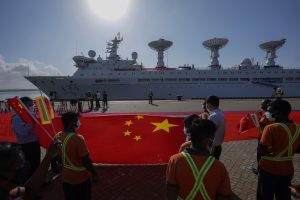A recent report by AidData, a research lab at the College of William and Mary in Williamsburg, Virginia, claimed that China might establish a naval base in Sri Lanka’s Hambantota Port in the next two to five years. This can be expected to increase Indian concerns over Chinese presence so close to its southern coastline.
The AidData report, titled “Harboring Global Ambitions: China’s Ports Footprint and Implications for Future Overseas Naval Bases,” identified eight locations where China might establish naval bases in the next two to five years. Sri Lanka’s Hambantota Port was number one on the list – meaning the likelihood of a Chinese base here is the highest. The others on the list are Bata, Equatorial Guinea; Gwadar, Pakistan; Kribi, Cameroon; Ream, Cambodia; Vanuatu; Nacala, Mozambique; and Nouakchott, Mauritania.
Between 2001 and 2021, China implemented 123 seaport projects worth $29.9 billion worldwide and funded the construction or expansion of 78 ports in 46 countries, the report said. Of these investments, Hambantota is China’s largest investment in a port project.
The scale of China’s development financing, the strategic value and location of Hambantota, China’s strong relationships with Sri Lankan elites, Colombo’s voting alignment with China in the United Nations General Assembly, and port characteristics suitable for supporting naval fleets were the reasons why the authors of the report picked Hambantota as the number one choice of the Chinese for a naval base.
In recent years, there has been much speculation over China’s use of Hambantota Port for military purposes. The AidData report will provide food for further speculation.
It will particularly deepen Indian apprehensions, Uditha Devapriya, head of International Relations at the Colombo-based independent think tank Factum, told The Diplomat.
Noted Sri Lankan geopolitical analyst Asanga Abeyagoonasekera, who is a senior fellow at The Millennium Project, told The Diplomat that India has been observing with concern, Sri Lanka’s increasing rapprochement with China since Mahinda Rajapaksa became Sri Lankan president in 2005.
India was alarmed when Sri Lanka allowed a Chinese submarine and a warship to dock at its port in the capital Colombo in 2014, Abeyagoonasekera recalled, adding that Indian concerns over the Port of Hambantota grew exponentially after Sri Lanka leased it to China Merchants Port Holdings Company Limited for 99 years for $1.12 billion in 2017.
Abeyagoonasekera said that several of India’s neighbors have failed to communicate their dealings with China effectively and transparently with the wide world.
According to Abeyagoonasekera, the establishment of overseas naval bases is a logical next step in China’s expanding global interests as naval bases are also key to safeguarding shipping routes and promoting trade and diplomacy. Currently, China has just one official overseas naval base — a facility in Djibouti — that is adjacent to a commercial port funded, constructed, and operated by China.
China has emerged as a major maritime nation in recent years. Its navy has grown from a force capable of only coastal operations to a blue-water navy. Many experts and policymakers believe that this signifies China’s ambitions for global power projection.
In the 2020 edition of The Science of Military Strategy, published by China’s National Defense University, China states that there “will be an increasing number of naval missions in overseas military operations and the expansion of the scope of operations, the requirements for logistics and equipment support are getting higher and higher,” Abeyagoonasekera said.
While China may be keen to safeguard its interests by building naval bases, establishing and running these bases may not be feasible.
As the AidData report points out, China is not in a position to defend any of the eight ports.
Additionally, China would be crossing a red line by setting up a naval base in Hambantota, Devapriya said. India and China do a lot of business together and despite the fierce media speculations, it is unlikely that China would establish a naval base in Hambantota, he said.
India has always been concerned about foreign powers establishing a foothold in Sri Lanka, given the proximity of the island to its southern coast and its location in the Indian Ocean.
Given the history and current strategic competition between India and China and the increasing divergence in the capabilities between the two nations, India has been aggressive in expressing its displeasure over any sign of warming ties between Colombo and Beijing. In 2022, for instance, India objected when a Chinese research vessel docked in Hambantota Port. Reports in the Indian media have speculated over China building a radar facility at Matara, about 50 kilometers from Hambantota.
Sri Lanka’s strategic geographical position has attracted the attention of numerous major global players, including China, India, and the United States – all seeking to establish a presence in the region. Despite Sri Lanka’s desire to remain untangled in international complexities, past administrations have struggled to effectively convey their commitment to a nonaligned foreign policy to these influential nations.
Devapriya told The Diplomat that Sri Lanka needs to do better in assuaging the concerns of India. Sri Lankan President Ranil Wickremesinghe just concluded a successful visit to India and the good relationships he forged there can be used to communicate Sri Lanka’s good intentions, Devapriya said. Wickremesinghe “can do the same when he visits China in a few months,” he added.
































